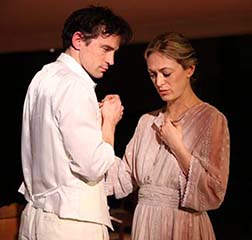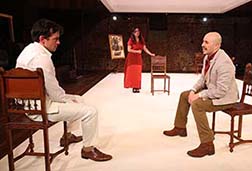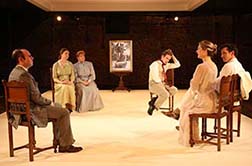
TWO VIEWS OF "SUMMER
AND SMOKE"
Philip Dorian
Lucy Komisar
|
Summer and Smoke
Through May 25 Blanche’s spirit does haunt Alma. “Streetcar” was written in 1947 and set contemporaneously in New Orleans; “Summer and Smoke,” was written a year later and unfolds between 1900 and 1916 in (fictional) Glorious Hill, Mississippi. In a way, Alma is sequel and prequel in one. The daughter of a rigid Episcopal minister and a mother who has retreated into a state of “perverse childishness” after a vaguely defined ‘breakdown,’ Alma (Marin Ireland) yearns for Doctor John Buchanan, Jr. (Nathan Darrow), her neighbor and childhood playmate. Their lives frequently intersect, but their clashing values preclude a lasting connection. John is a realist, with hedonist leanings, while Alma is a fragile, spiritual soul. Her very name, she reminds John, means soul in Spanish. By the time Alma is ready to accept John on his terms, he has abandoned his former ways. Planning to settle down with a younger woman, who had been Alma’s music student (salt in the wound), John rebuffs Alma. “The tables have turned with a vengeance,” Alma laments. Directed by Jack Cummings III, artistic director of the co-producing (with Classic Stage Company) Transport Group, the production is stripped down to its essential relationships. The only set pieces are a photographic rendition of the fountain in the town square and an anatomy chart in the doctor’s office, both on easels. No props either, except for six chairs carried on and off by the actors as needed. All others are pantomimed. (The one exception, a physical prop in the final scene, is impactful, but miming the others, like John’s stethoscope and Alma’s mother licking an ice cream cone, can be distracting.) Marin Ireland’s Alma is less of a fluttering southern belle than others I’ve seen. Her veneer of refinement masks Alma’s frustration at her inability to override her ingrained puritanism. She wants to, desperately; her self-denial is heart-breaking to witness. Ireland captures the playwright’s intent. Alma is “prematurely spinsterish,” Williams wrote. “Her true nature is hidden even from herself.” It is a beautiful performance. Darrow is a laid-back John, Jr., even in the fellow’s reckless stage. It does amplify the ‘opposites attract’ element, but seems to slow the proceedings. Others who impress include T. Ryder Smith as Alma’s overbearing father and Barbara Walsh as her dotty mother. As Mrs. Bassett, the town busybody, Tina Johnson nails every laugh, a more than incidental contribution. The “Summer and Smoke” battle between repression and release is a losing one. Alma surrenders in the final scene where she goes off with a traveling salesman to the Casino where she had earlier rejected John’s advances. Tennessee Williams’ plays are written to be staged, of course, but some of his in-script notes on character and setting are exquisite in themselves. That final scene is achingly affecting, as is Williams’s own note on the scene: “The mysteriously sudden intimacy that sometimes occurs between strangers more completely than old friends or lovers moves them both.” Tell me you’ve never felt that.
Marin Ireland is stunning in Tennessee Williams’ “Summer and Smoke” “Summer and Smoke.”
Marin Ireland is compelling in the Transport Group’s minimalist production of Tennessee Williams’ “Summer and Smoke.” Her lovely slow southern accent is all the decoration the stage needs. Director Jack Cummings III does a fine job in evoking time and place with no accoutrements required. Ireland’s “Alma,” Spanish for soul as she tells people, wears it on her sleeve for the audience, but bottles it up when she is with John, her neighbor, with whom she has been smitten since a girl. But this is Mississippi, from the turn of the last century to 1916, and that means women’s sensual feelings are suppressed. John (the excellent Nathan Darrow) is a rake, who likes gambling, and his father, the town doctor and a widower, throws him out then asks him back. John somehow gets through medical school. Alma becomes a music teacher.
Alma’s psychic health isn’t helped by a rigid minister father (T. Ryder Smith). Her mother (the excellent Barbara Walsh) has escaped by having a breakdown, which is expressed by being catatonic except when she demands ice cream. When Alma tells Dr. John she has nervous heart trouble, he tells her the symptoms means she has doppleganger, which she doesn’t understand means a double. John is a charmer in a white suit. Alma is almost syrupy sweet in a long lacey beige dress. She is not the woman John needs. He takes up with Rosa, the sexually flaunting daughter of the casino owner, a Mexican who built his wealth from nothing. Williams includes a bit in this smothering town which must be autobiographical. Alma hosts a reading group, and an insufferable middle-aged Mrs. Bassett (Tina Johnson) refuses to let a young writer (Jonathan Spivey) read his own work. Jonathan Spivey as Roger, Glenna Brucken as Rosemary, Tina Johnson as Mrs Bassett, Ryan Spahn as Archie, Marin Ireland as Alma and Nathan Darrow as John. Photo by Carol Rosegg. When John invites Alma to the casino, she runs from where it could lead. Though he will admit she had nothing to fear: “I’m more afraid of your soul than you are of my body.”
Williams wants to tell us how unfulfilled sexual feelings can be suffocating. Except it’s rather disingenuous to suggest that in that time, young women should readily engage in sex. It would have been enough to learn how to express feelings. But maybe he was talking about a woman as a doppleganger for a repressed homosexual man. The fine bluesy violin music is by Michael John LaChiusa. Visit Lucy’s website http://thekomisarscoop.com/
|
| museums | NYTW mail | recordings | coupons | publications | classified |




